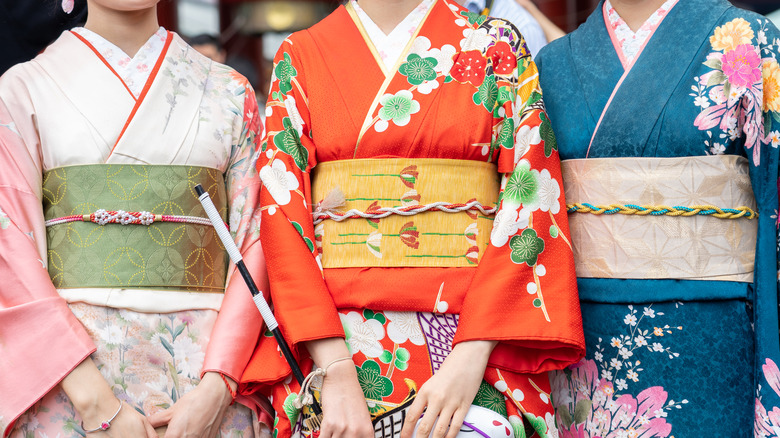Here's Why You Should Think Twice Before Buying A Kimono
If you're fond of floral prints, comfort, and a flowy, even romantic, style, you might be tempted to buy a kimono. After all, they're light, beautiful, and — at the moment — available everywhere, including Amazon and virtually all major retailers. But before clicking "buy," there is a thing or two you should consider.
As we all know, kimonos are traditionally Japanese wear, and a powerful symbol of Japanese culture and tradition. In Japan, they've been around in some form for over a thousand years, and there are different types of kimonos for different occasions, as well as cultural rules for how to wear them properly (via Masterpiece of Japanese Culture). It's important to note that most of the loose-flowing, flowery robes marketed as "kimonos" in the U.S. today are actually no such thing.
Of course, most westerners know little about the history of Japanese clothing, and even less about the cultural significance and rules surrounding specific clothing items. And in Japan, this is not a concern. After all, most Japanese people today wear western-style clothing, and turn to kimonos only for special occasions or when making an overt effort to embrace their cultural heritage, like when attending a traditional tea ceremony.
Not only do Japanese people generally welcome foreigners taking an appreciative interest in Japanese fashion (via The Kyoto Costume Institute), they make a concerted effort, for economic and tourism reasons, to export it around the world. They have no more problem with the export of kimonos than they do with the global popularity of karate or sushi.
Japanese fashion has had a global influence
In the United States, though, cultural sensitivities tend to run higher, and accusations of cultural appropriation (the adoption of one element of a culture by members of a different culture) are more common. For example, when the Boston Museum of Fine Arts offered visitors a chance to try and on and be photographed in a kimono in front of Claude Monet's La Japonaise, uproar ensued. The museum canceled the event following protests that it was racist (via BBC News).
Ironically, the sentiment was not shared by many Japanese. Jiro Usui, the deputy consul general of Japan in Boston, said that the consulate "did not quite understand the point of the protest" (via CNN). Manami Okazaki, a Tokyo-based fashion and culture writer, added, "There are people who are truly offended by cultural appropriation and their feelings are completely valid, but in Japanese culture, it just doesn't work the same way. (The Japanese) are really trying to share Japanese culture, so it's very, very different to a minority culture that feels like they've had something stolen from them."
Ultimately, it seems to come down to respect. Most cultures are more than happy to share aspects of their heritage — fashion or otherwise — if they are received and appreciated respectfully.

